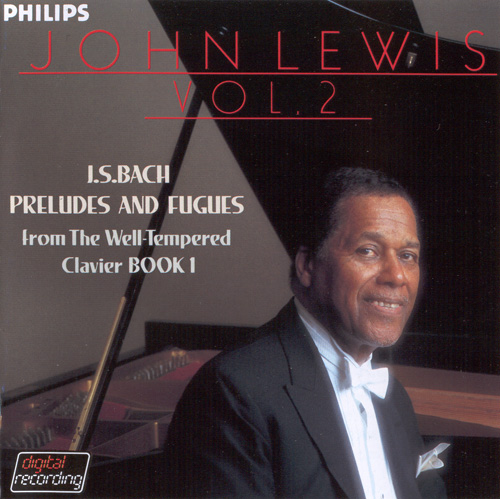 This Collectables reissue pairs up two albums by pianist, arranger, and Modern Jazz Quartet musical director John Lewis. Original Sin was Lewis' second experiment with a symphony orchestra. This ballet was originally performed in 1961 at the Alcazar Theatre in San Francisco, CA, with the libretto provided by beat poet Kenneth Rexroth based on Adam and Eve. Without the added excitement that improvisation could have provided, Original Sin comes across stiff. On the other hand, Essence, released in 1964, allows space for improvising around the charts provided by vibraphonist Gary McFarland. Arranged by Lewis, it featuring an array of jazz greats including Eric Dolphy, Phil Woods, Freddie Hubbard, Benny Golson, Jimmy Giuffre, and Jim Hall. Both sessions have their moments, but Essence is the main attraction on this disc. by Al Campbell
This Collectables reissue pairs up two albums by pianist, arranger, and Modern Jazz Quartet musical director John Lewis. Original Sin was Lewis' second experiment with a symphony orchestra. This ballet was originally performed in 1961 at the Alcazar Theatre in San Francisco, CA, with the libretto provided by beat poet Kenneth Rexroth based on Adam and Eve. Without the added excitement that improvisation could have provided, Original Sin comes across stiff. On the other hand, Essence, released in 1964, allows space for improvising around the charts provided by vibraphonist Gary McFarland. Arranged by Lewis, it featuring an array of jazz greats including Eric Dolphy, Phil Woods, Freddie Hubbard, Benny Golson, Jimmy Giuffre, and Jim Hall. Both sessions have their moments, but Essence is the main attraction on this disc. by Al Campbell
Tracklist:
John Lewis - Original Sin (1961)
1 Creatoin of the World & Creation of Adam 3:54
John Lewis
2 Introduction 0:48
John Lewis
3 Zebra, Lion, Camel 1:28
John Lewis
4 Walrus, Ape 0:52
John Lewis
5 Lamb, Leopard 1:47
John Lewis
6 Rabbit, Skunk 0:44
John Lewis
7 Variant V: Mountain Sheep, Deer 1:38
John Lewis
8 Finale 2:11
John Lewis
9 Birth of Eve 3:47
John Lewis
10 Adam and Eve Pas de Duex 2:36
John Lewis
11 Teaching and Temptation 4:12
John Lewis
12 Expulsion from the Garden of Eden 2:46
John Lewis
Credits:
Conductor, Composed By – John Lewis
John Lewis – Essence (1962)
13 Hopeful Encounter 4:40
John Lewis
14 Tillamook Two 7:11
John Lewis
15 Night Float 4:18
John Lewis
16 Notions 4:00
John Lewis
17 Another Encounter 5:10
John Lewis
18 Wish Me Well 7:44
John Lewis
Credits:
Alto Saxophone – Eric Dolphy (tracks: 15)
Baritone Saxophone – Gene Allen (tracks: 14, 17), Jimmy Giuffre (tracks: 15)
Bass – George Duvivier (tracks: 15), Richard Davis (tracks: 13, 14, 16 to 18)
Basset Horn – Don Stewart (tracks: 14, 17)
Bassoon – Loren Glickman (tracks: 14, 17)
Clarinet – Phil Woods (tracks: 14, 17)
Composed By, Arranged By – Gary McFarland
Drums – Connie Kay
Flute – Harold Jones (tracks: 14, 17)
Flute [Alto] – Eric Dolphy (tracks: 14, 17)
French Horn – Gunther Schuller (tracks: 15), Bob Northern (tracks: 13, 16, 18), Robert Swisshelm (tracks: 13, 16, 18)
Guitar – Billy Bean (tracks: 13, 16, 18), Jim Hall (tracks: 14, 15,17)
Oboe – William Arrowsmith (tracks: 14, 17)
Piano – John Lewis
Tenor Saxophone – Benny Golson (tracks: 15)
Trombone – Mike Zwerin (tracks: 13, 16, 18)
Trumpet – Freddie Hubbard (tracks: 13, 16, 18), Herb Pomeroy (tracks: 16), Louis Mucci (tracks: 13, 16, 18), Nick Travis (tracks: 13, 16, 18)
Tuba – Don Butterfield (tracks: 13, 16, 18)


































.jpg)







